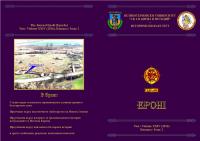ДРЕВНЯЯ ФРАКИЙСКАЯ ЦИВИЛИЗАЦИЯ
ANCIENT THRACIAN CIVILIZATION
Author(s): S. M. KrykinSubject(s): History, Economic history, Ancient World
Published by: Великотърновски университет „Св. св. Кирил и Методий”
Keywords: Thracia; chiefdom; protocivilization; Pistiros; Thracian state
Summary/Abstract: The Thracian society developed along and simultaneously with ancient Greek civilization. The urbanized Greeks considered Thracians barbarians. But Thracian society did not compete with them, it simply followed different order and rules. Similar to Scythians and Huns, Thracians formed a specific social and political system of “complex chiefdom” with a peculiar system of values. A part of the modern scientific literature presented Thrace as a part of an advanced ancient barbaric province, a civilization’s backyard region with savage people and robbers. The contemporary exploration of Scythian and Hunnish territories proved that some nations of antiquity as well as of the Middle Ages could live according different rules. Their societies, settlements, economy, moral values differed from Greek or Roman ones. Rural economy played a leading role in Thracian economy and its development compensated the weakness of extensive farming and cattle breeding. Such typeof agricultural economy could not turn into a market economy and this characteristic limited the growth of Thracian society. Their secondary occupations were robbery, fighting, and mercenary. The Odrysian kings respected the historical experience of Achaemenids and of the Delian league. They managed to put under control some parts of Aegean Thrace and a number of small Greek polices, as well as they tried to superimpose primitive taxes to their subjects. Even when Thrace became a part of the Hellenistic world, the model of Thracian state still recalls Scythian, Hunnish and even, Mongol chiefdom. Only royal cities were political centers of some economic importance. Numerous highland fortresses served only as asylums. Foreign traders served to the aristocracy. The concentration of plentitudes was limited by inconsiderable resources of subsistence farming of the Thracians. Gold and silver were used mostly in cult practice, rather than in trade. The influence of the Hellenistic world on Thracia was considerable, but only the annexation of Thrace by the Roman Empire fundamentally modified the organization of Thracian tribal society. If one judge on the base of Aristotle’s definition can be said, that only the Greeks and later the Romans built civilizations. In this sense the author think that the Thracians gave birth to a civilization not far developed of the archaic tribal system.
Journal: Епохи
- Issue Year: 24/2016
- Issue No: 2
- Page Range: 203-219
- Page Count: 17
- Language: Russian

